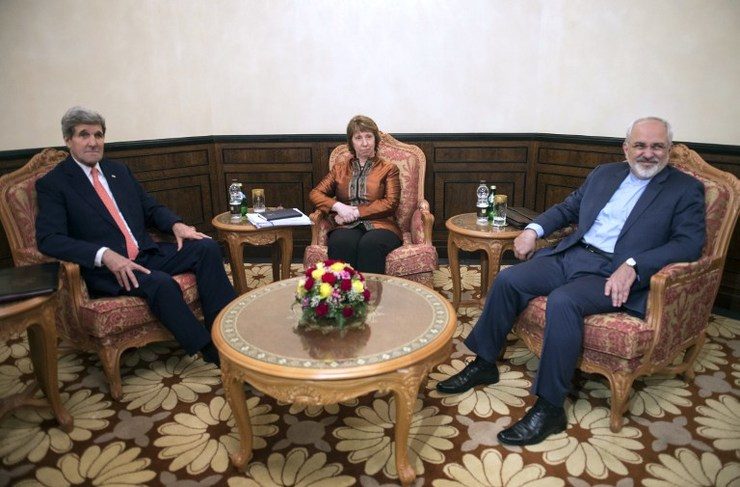SUMMARY
This is AI generated summarization, which may have errors. For context, always refer to the full article.

VIENNA, Austria – Iran and the US held one-on-one talks Wednesday, November 19, as a deadline loomed to reach a mammoth nuclear deal, seeking common ground on the two crucial remaining issues: uranium enrichment and sanctions relief.
US Secretary of State John Kerry and other foreign ministers from the six powers meanwhile decided to hold off for at least another 24 hours joining the final round of negotiations before Monday’s cut-off point.
Kerry remained in London before talks in Paris Thursday, November 20, with the foreign ministers of France – widely seen as one of the six powers with the toughest stance on Iran – and of Saudi Arabia, itself no friend of Iran.
Russian Foreign Minister Sergei Lavrov, whose country is a crucial player in the talks despite the Ukraine crisis, will only attend if there is sufficient progress, Moscow’s lead negotiator Sergei Ryabkov told Russian media.
“Right now a lot depends on Kerry’s visit. Reaching a deal depends on the willingness and ability of the United States to lift sanctions” on Iran, Russian agency RIA Novosti quoted a Russian source as saying.
Upping the ante, Iran’s Foreign Minister Mohammad Javad Zarif, who has been in Vienna since Tuesday, said a deal was “possible” but only if the six powers made no “excessive demands”.
“If…we don’t get a result, then the world will understand that the Islamic Republic sought a solution, a compromise and a constructive agreement and that it will not renounce its rights and the greatness of the nation,” Zarif said.
But Kerry, who held the latest in a string of meetings with Zarif in Oman last week, put the onus on Iran.
“It is imperative that Iran works with us with all possible effort to prove to the world that the programme is peaceful,” Kerry said in London on Tuesday.
British Foreign Secretary Philip Hammond echoed his comments, calling for more “flexibility by the Iranians to convince us that their intentions in their nuclear programme are entirely peaceful.”
Drums of war
The landmark accord being sought by Monday’s deadline, after months of negotiations, is aimed at easing fears that Tehran might develop nuclear weapons under the guise of its civilian activities – an ambition it denies.
It could resolve a 12-year standoff, silence talk of war, help normalise Iran’s relations with the West, boost the beleaguered Iranian economy and mark a rare foreign success for US President Barack Obama.
In order to make it virtually impossible for Iran to assemble a nuclear weapon, the US, China, Russia, Britain, France and Germany (the P5+1) want Iran to scale down its nuclear programme.
Some areas appear provisionally settled, such as the future of the Arak nuclear reactor and tighter UN inspections to better detect any attempt to build a bomb.
But two key issues remain to be resolved: uranium enrichment – rendering uranium suitable for peaceful uses but also, at high purities, for a weapon – and the pace at which sanctions on Iran would be lifted under a deal.
Iran wants to massively ramp up the number of enrichment centrifuges – in order, it says, to make fuel for a fleet of future reactors – while the West wants them dramatically reduced, reportedly by half.
The 6 powers say Iran has no such need in the foreseeable future. Russia is contracted until 2021 to fuel Iran’s only power reactor at Bushehr and last week signed a deal to build – and fuel – several others.
In exchange for any reduction in its activities, Iran wants sanctions lifted. But they are different kinds of sanctions – UN, US and EU ones – and the powers want to stagger any suspension.
“They want everything all at once and this is not realistic,” one Western diplomat involved in the talks said, calling Tehran’s demands “unrealistic.”
Another extension?
Given the differences, many analysts expect more time to be put on the clock, perhaps by agreeing certain areas and leaving others for further discussion.
The alternative – walking away – would be “catastrophic” and “foolish,” Arms Control Association analyst Kelsey Davenport told AFP.
For now though, with another extension presenting risks of its own – fresh US sanctions, not least – officials insist that they remain focused on getting the job done in time. – Rappler.com
Add a comment
How does this make you feel?
There are no comments yet. Add your comment to start the conversation.